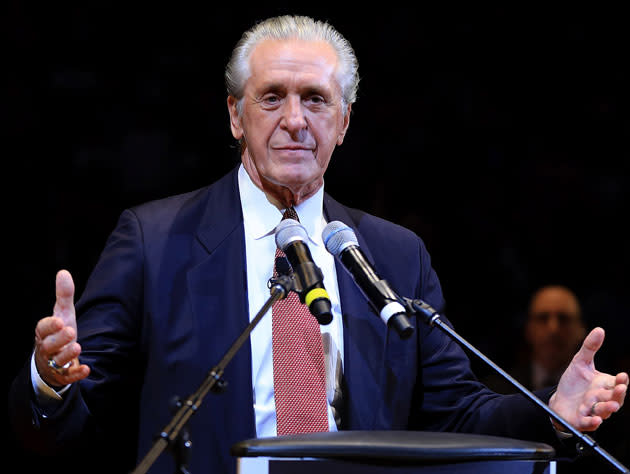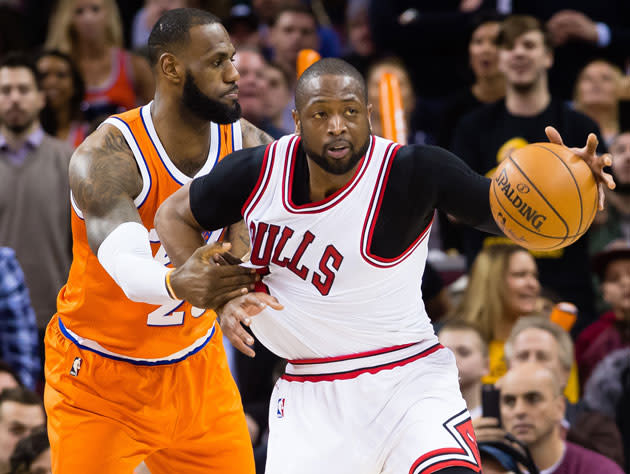Pat Riley nearly concocted a Dan Gilbert-styled response after LeBron James left Miami

Wright Thompson’s feature on Miami Heat president Pat Riley is about so, so much more than the time he nearly got embarrassingly upset at LeBron James, or his stated regrets about free-agent decisions both past and pressing.
[Follow Ball Don’t Lie on social media: Twitter | Instagram | Facebook | Tumblr]
In the piece, Thompson details an NBA lifer who continues to thrive ahead of doubt, at least professionally and to uncertain ends, sticking with the pro game long after the 72-year old Hall of Famer had given it far too much.
By the time the end hits, you will not be surprised to read a Pat Riley text that insists “I NEED ONE MORE,” referring to a 10th championship as player, assistant coach, head coach and team president, and another one that acknowledges what lies ahead for a Heat team that just missed the playoffs in 2016-17: “AND I KNOW THIS WILL BE THE TOUGHEST TO GET.”
James’ choice to leave Miami and return to the Cleveland Cavaliers as a free agent in 2014 is just part of the Pat Riley Picture, but one anecdote from the ESPN feature typifies the way in which James’ lower-case decision turned the Heat president into an all-caps texter.
Following drawn plans for James and manager Maverick Carter that included the franchise’s actual NBA championship trophies and an easel for a free-agent presentation, Riley was met with a figurative cold shoulder:
Riley respects Carter, and when he walked into the suite and saw James with agent Rich Paul and friend Randy Mims but no Maverick, part of him knew the meeting wasn’t sincere. He told Elisburg to keep the trophies and easel in the hall. James and his associates were watching a World Cup game, which they kept glancing at during the presentation. At one point, Riley asked if they’d mute the TV.
Riley flew home worried and got a text telling him to be ready for a call. About 15 minutes later, his phone rang and Paul was on the other end. The agent handed the phone to LeBron, who started by saying, “I want to thank you for four years …”
“I was silent,” Riley says. “I didn’t say anything. My mind began to just go. And it was over. I was very angry when LeBron left. It was personal for me. It just was. I had a very good friend who talked me off the ledge and kept me from going out there and saying something like Dan Gilbert. I’m glad I didn’t do it.”
Instead, Riley kept his frustration under a dramatically sized lock and key, choosing to comment only on James’ move to the Cavaliers in 2014 through passive/aggressive vents that James (who did not comment for Thompson’s story) reportedly was not altogether forgiving of.
Riley, however, appears to now understand the impetus behind the move:
“He went home because he had to go home,” he says. “It was time. It was really time for him to go home, in his prime. If he’s ever gonna do anything in Akron again, this was the time to do it. Otherwise, he’d have had a scarlet letter on his back the rest of his whole life.”
It was James’ time to do it. Though the Cavaliers looked a blank slate in comparison to the Miami Heat’s settled stararchy in the summer of 2014, the team still had provocative options in young point guard Kyrie Irving, and two No. 1 overall picks as trade bait to play with. Two Finals trips and a championship later, LeBron’s basketball decision has long ago been assured as sensible.
Most did even that summer, noting the age of Heat stars (and free agents) Dwyane Wade and Chris Bosh, but this didn’t deter Riley from signing the then-32 year-old Wade (at two years, $34 million with a player option) and just-turned 30 Bosh (five years, $118 million) to ignite the turnaround.
Bosh fell later that (All-Star) year due to blood clots, a condition that has put his basketball career on hold. Wade turned in two All-Star seasons in James’ absence, with one playoff trip, before leaving as a free agent in 2016 after some contract turmoil of his own with the Heat.
In talking with Thompson, Riley details the dissatisfaction some three years later:
But of course, Riley says, almost immediately after LeBron left, Bosh’s camp wanted to reopen a deal they’d just finished, knowing the Heat had money and felt vulnerable. Bosh threatened to sign with the Rockets. In the end, Riley gave Bosh what he wanted. Now he wishes he’d said no to Bosh’s max deal and given all that money to Wade. (James and Bosh declined to comment for this story. Wade issued a statement thanking Riley for their years together.)
“You never think it’s gonna end,” Riley says. “Then it always ends.”
If you think Riley is working over the top, in his pull-on-your-trousers moment, consider the commotion that has rocked the Heat organization since James’ departure.
James leaving a franchise is a harrowing thing. It shook the Cavaliers so badly in 2010 that the team’s ownership decided to get mad on the Internet prior to wasting four seasons lying to itself that it could continue apace without James. Riley slightly modified Cleveland’s approach, but the impact of James’ departure feels just as severe no matter how semi-dignified the response.
Bosh’s health was in significant peril, two different times, though he appears to have recovered fully while minding his blood clot conditions. His movement to rejoin the Heat (who paid him over $23.7 million for 2016-17 in insured, guaranteed salary) cannot be characterized as someone merely champing at the bit to shoot hoops, this time. Miami could be in for a protracted, and possibly public legal battle regarding Bosh’s right to play for the team that signed him to a guaranteed contract in 2014, before his blood clot fears arose.
Wade is a bit more than Mt. Rushmore for South Beach, he remains Mr. Miami Heat even while preparing to suit up for the Bulls in Boston on Wednesday.
For him to leave the Heat due to a contract conflict – with Riley unable to meet with Wade and his reps, per Wade’s request according to Pat, and team owner Mickey Arison representing the franchise in negotiations – is as embarrassing in retrospect as it was obvious from the start.
Wade had given money back through several slightly sub-maximum contracts in order to help Riley (that’s why D-Wade wanted to talk with Arison, and remove basketball terms like “salary cap space”) build a solid Heat rotation, while Riley wanted to roll his flexibility forward in 2016. Though just after giving Hassan Whiteside, after just 75 career NBA starts, a four-year, $98 million deal.
That’s not a shot at Whiteside (who proved worthy of that money in the first year of his contract), just the shot from Wade’s side of things prior to the future Hall of Famer’s move to sign a two-year, $47 million deal with the Chicago Bulls in 2016.
That deal, of course, contains a player option for next season. Mr. Miami Heat could be just over two months away from becoming a member of the Miami Heat again.
Bosh? His future with Miami remains unsettled, his NBA outlook unsettling to attempt to anticipate. James seems fit to retire with the Cavaliers, though he has plenty of time to surprise us.
Pat Riley has a lot more to deal with, as we find out in Thompson’s piece.

In it the Heat president, in place since 1995 and with just one break in the action (during the 1990-91 season, as an NBC TV analyst) since the 1960s, discusses the high school reunion party from 2013 he organized, pitched after the Heat’s third championship with him as boss. While a series of prominent baby boomer-era hits (“My Girl,” “Listen to the Music,” and “Born to Run” are mentioned in the piece, the guy didn’t even have time for album tracks) played at a party that cost Riley $160,000, he briefly considered walking away before what would have been James’ last year in Miami.
Nearly four years later, el jefe of the Heat rolls on through significant storm and stress. Still working, still sticking most of the season out in Miami. Too much of the season, one might conclude after reading the feature.
Riley and his family suffered through a cancer scare with daughter Lis, prior to a confirmed clean bill of health, during a 2016-17 season that was noted for its up-and-down turns. Tellingly, for the piece, this is just one of many tales of familial woe for a man who has been in the public eye for half a century now, dating back to his star turn at the University of Kentucky.
Unlike some of his more obvious career turnarounds – his ascension in Los Angeles, his perfect timing in New York, his mix of outrageous fortune and frustration in Miami – Riley and the Heat’s outlook as it enters the 2017 offseason is rather tangled. The team did well to secure Whiteside, find the best in Dion Waiters, appreciate Goran Dragic (to Dwyane Wade’s possible estimation, perhaps a little too much) and trust Coach of the Year candidate Erik Spoelstra.
Those are the prominent particulars; standout personalities are always common to Pat Riley’s schemes. The rest of the Riley story is rarely as noted, and Thompson’s piece should go a long way toward fixing that.
– – – – – – –
Kelly Dwyer is an editor for Ball Don’t Lie on Yahoo Sports. Have a tip? Email him at KDonhoops@yahoo.com or follow him on Twitter!
More from Yahoo Sports:
• The final 2017 NFL mock drafts from Yahoo Sports
• Gregg Popovich leaves massive tip on $815 bill
• Rockets advance, but Westbrook is the story again
• Tim Brown: Why we shouldn’t slam unlikely MLB slugger

 Yahoo Sports
Yahoo Sports 

